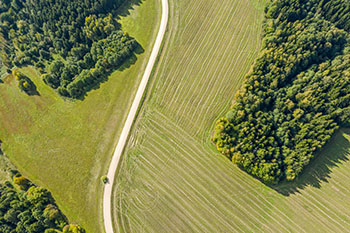Cost share available to forest landowners and industry
May 17, 2021

Multiple cost share opportunities are currently open for application, and the Tennessee Department of Agriculture’s Division of Forestry (TDF) can help. During the month of May, forest landowners can apply for financial assistance to help establish or enhance their woodlands, and loggers can apply to improve harvesting capacity.
“Supporting Tennessee’s forest industries with financial aid helps keep our forests and wildlife healthy and sustainable,” State Forester David Arnold said. “The goal of these cost share programs is to encourage landowners and loggers to use best practices in their land management and during harvesting operations.”
Financial assistance to landowners and loggers is available through numerous agencies and programs. Each program has different objectives and TDF Area Foresters can help navigate options, eligibility rules, and sign-up periods. Most programs require the recipient to contribute a share of the cost. Cost shares can range from covering 50 to 100 percent of costs, and most have a maximum of $15,000 per program, per recipient.
Forestry programs under the Tennessee Agricultural Enhancement Program (TAEP) promote long-term investments in Tennessee’s forests by providing cost share incentives to qualifying landowners and loggers. The programs support sustainable forest management practices on forestland for timber, wildlife habitat, clean water, and soil protection by providing incentives for landowners to establish or manage hardwood or softwood forest stands. TAEP is also available for loggers and sawmills to avoid environmental and water quality impacts resulting from timber harvesting.
The Duck and Elk River Watershed Buffer Initiative cost share program was created four years ago by a coalition of Tennessee’s forest and wildlife conservation agencies and organizations. This program aims to improve riparian zones, address critical aquatic habitat degradation, and improve forest health in Bedford, Coffee, Dickson, Franklin, Giles, Hickman, Humphreys, Lewis, Lincoln, Marshall, Maury, Moore, and Williamson counties.
The Southern Pine Beetle Initiative (SPBI) encourages establishment of pine forest stands that are resistant to infestations and management of existing stands to make them more resilient. SPBI is available to help timber harvesters reduce operational costs associated with harvesting small acreages or hauling distance to a market. Growing new pine forests, managing current land, and reducing expenses for loggers all work together to stave off economic losses and protect woodlands. The USDA Forest Service provides funds for this initiative, and TDF administers the allocations.
Contact your local Area Forester to learn more about these and other financial assistance programs, determine eligibility, apply, and implement a plan. Learn more online at www.tn.gov/agriculture/forests/landowners/financial.html.
Your local Area Forester can be found at www.tn.gov/content/dam/tn/agriculture/documents/forestry/AgForAreaForesterMap.pdf.
For more content like this, check out the latest issue of the Cooperator.
“Supporting Tennessee’s forest industries with financial aid helps keep our forests and wildlife healthy and sustainable,” State Forester David Arnold said. “The goal of these cost share programs is to encourage landowners and loggers to use best practices in their land management and during harvesting operations.”
Financial assistance to landowners and loggers is available through numerous agencies and programs. Each program has different objectives and TDF Area Foresters can help navigate options, eligibility rules, and sign-up periods. Most programs require the recipient to contribute a share of the cost. Cost shares can range from covering 50 to 100 percent of costs, and most have a maximum of $15,000 per program, per recipient.
Forestry programs under the Tennessee Agricultural Enhancement Program (TAEP) promote long-term investments in Tennessee’s forests by providing cost share incentives to qualifying landowners and loggers. The programs support sustainable forest management practices on forestland for timber, wildlife habitat, clean water, and soil protection by providing incentives for landowners to establish or manage hardwood or softwood forest stands. TAEP is also available for loggers and sawmills to avoid environmental and water quality impacts resulting from timber harvesting.
The Duck and Elk River Watershed Buffer Initiative cost share program was created four years ago by a coalition of Tennessee’s forest and wildlife conservation agencies and organizations. This program aims to improve riparian zones, address critical aquatic habitat degradation, and improve forest health in Bedford, Coffee, Dickson, Franklin, Giles, Hickman, Humphreys, Lewis, Lincoln, Marshall, Maury, Moore, and Williamson counties.
The Southern Pine Beetle Initiative (SPBI) encourages establishment of pine forest stands that are resistant to infestations and management of existing stands to make them more resilient. SPBI is available to help timber harvesters reduce operational costs associated with harvesting small acreages or hauling distance to a market. Growing new pine forests, managing current land, and reducing expenses for loggers all work together to stave off economic losses and protect woodlands. The USDA Forest Service provides funds for this initiative, and TDF administers the allocations.
Contact your local Area Forester to learn more about these and other financial assistance programs, determine eligibility, apply, and implement a plan. Learn more online at www.tn.gov/agriculture/forests/landowners/financial.html.
Your local Area Forester can be found at www.tn.gov/content/dam/tn/agriculture/documents/forestry/AgForAreaForesterMap.pdf.
For more content like this, check out the latest issue of the Cooperator.